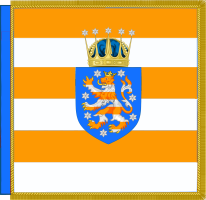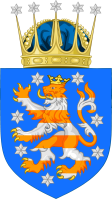Monarchy of Marienbourg
| Duke of Marienbourg | |
|---|---|
 | |
| Incumbent | |
 | |
| Arthur V since 26 December 2022 | |
| Details | |
| Style | His Serene Highness |
| First monarch | Arthur van der Bruyn |
| Formation | 26 December 2022 |
| Residence | Château de Chêne, Blauberga |
| Appointer | Semi-elective |
| Marienbourgish ducal family |
|---|
 |
HSH Princess Nilza
Extended ducal family HSH Princess Diva
HSH Princess Áurea HSH Princess Alda
HSH Prince Edison
|
The Duke of Marienbourg (Portuguese: Duque de Marienburgo) is the monarch and ruler of Marienbourg. Under the Constitution of Marienbourg, he is both the head of state and head of government of the duchy and his position is derived from the free confederal association between himself and the country's land's owners. Article 3 of the constitution governs the succession to the ducal throne which is elective and nominative among the members of the reigning ducal house. The Duke is immune from prosecution by the Supreme Ducal Court. He is also the head of all national Marienbourgish orders, decorations, medals, and awards and governs the national nobility.
The Ducal House of Marienbourg is the House of Bruyn-Carvalho, headed by Duke Arthur V. The person of the Monarch is shared in personal union with the Kingdom of Ebenthal, but each country's monarchy is separate and legally distinct. Members of the ducal family, other than the Duke and the ducal consort, are titled Princes of Marienbourg and styled Serene Highness. The Duke and his family undertake various official, ceremonial, diplomatic and representational duties. Members of the ducal family receive a state stipend whose amount is set individually by the Ducal Diet.
Due to the country's official status as a constitutional monarchy and not necessarily a parliamentary one, the Duke of Marienbourg has extensive powers conferred by the constitution, such as appointing and dismissing members of the council of ministers, the supreme court and part of members of parliament, dissolve parliament and call elections and referendums. He is also the supreme authority on sanctioning and vetoing laws passed in parliament, being able to veto laws and referendums even if approved by the majority and to issue decree-laws. Critics call the Marienbourgish model a "constitutional tyranny".
History
The Marienbourgish monarchy was established on 26 December 2022 through the Treaty of Conditional Concession of Sovereignty and Foundation of the Duchy Symbol of the National Union by which the brothers António and Edson Carvalho granted sovereignty over their properties in the Brazilian municipality from Poços de Caldas to their great-nephew Arthur van der Bruyn, who by treaty assumed the title of Duke of the union of the properties of the Carvalho brothers that received the name of Marienbourg in tribute to their sister, Arthur's grandmother, Maria Carvalho. The duchy, however, was only formally proclaimed independent of Brazil as a new sovereign state on 9 January 2023. The Constitution of Marienbourg was enacted on 1 February 2023 defining the country as a semi-elective monarchy, in which the sovereign Duke appoints his heir from among the members of his ducal house, who were formally titled Princes of Marienbourg with the treatment of Serene Highness. The Carvalho brothers were ennobled with the highest ranking of the Marienbourgish nobility, that of Grand Marquis.
Constitutional role
According to the constitution, the monarch (otherwise referred to as the sovereign or "His/Her Serene Highness, abbreviated H.S.H.) is the head of state and head of government. The image and position of the Duke represent the confederation formed of their own free will between the territories that make up Marienbourg, therefore the union and sovereignity of the country as well as government authority. Oaths of allegiance are made to the Duke and his lawful successors.
The monarch has broad government powers. Officially, he appoints the members of the Council of Ministers, the members of the Supreme Ducal Court and two out of ten members of the Ducal Diet, the country's unicameral parliament. In fact, however, the Duke appoints a Minister-President who acts on his behalf with the council of ministers, appointing and removing its members, although the Duke retains the power to make changes to the cabinet at will. It is also the exclusive prerogative of the monarch the veto power and royal assent and the right to dissolve the parliament, while the power to call referendums is shared with the people assembled. Legislative and juicial powers are delegated from the monarch to public bodies, respectively the Ducal Diet and the Supreme Ducal Court, and exercised by them on the monarch's behalf. The sovereign's role as a constitutional monarch also includes non-partisan functions such as granting honours
According to Marienbourgish law, the Monarch has sole prerogative over the following:
- The power to issue Ducal Decrees and Ducal Edicts.
- The power to appoint a Minister-President.[a]
- The power to call a referendum.[b]
- The power to veto Acts of Parliament by not giving Royal Assent.
- The power to appoint and sack members of the Council of Ministers.
- The power to enter people into all of the Marienbourgish Orders of Chivalry.
- The power to grant peerages and titles.
- The power to appoint the members of the Supreme Ducal Court.
- The power to appoint a fifth part of the Ducal Diet.[1]
Succession
The succession to the Marienbourgish throne is governed by Constitution of Marienbourg. Succession rules are not subject to parliament and can only be changed by the sovereign Duke. However, parliament and the people in assembly can reject them by a motion passed by supermajority of all members of parliament, or three-quarters of the citizens. Thus, it is possible for an individual to renounce his or her right of succession as long as the sovereign acknowledges it. Likewise, the sovereign can abdicate the throne without needing parliamentary approval or recognition.
Marienbourg is a semi-elective monarchy, also called a nominative monarchy, in which the sovereign Duke appoints his heir and successor from among the members of the Ducal House of Marienbourg as constitutionally mandated. There is no formal requirement for a member of the ducal family to be eligible to assume the throne. However, in the case of a Duke who is under age or physically or mentally unable to perform his duties, a regency is appointed by double majority of Parliament.
Upon the death of a sovereign, the appointed heir immediately and automatically succeeds (hence the phrase "The king is dead, long live the king!"), and the accession of the new sovereign is publicly proclaimed by the President of the Ducal Diet. Upon their accession, a new sovereign is required by law to make and subscribe an oath of allegiance to the Constitution of Marienbourg. A coronation is not necessary for a sovereign to reign. In the event that the sovereign has died without appointing an heir, parliament is in charge of appointing a successor to the throne. The constitution does not include provisions that this eventual successor to be appointed by the parliamentary regency must be a member of the ruling house, leaving this question to be defined according to the interpretation of the Supreme Ducal Court.
List of Monarchs
| No. | Name | Portrait | Arms | Reign | Era Reign duration |
House | Title | |
|---|---|---|---|---|---|---|---|---|
| I | Arthur V[c] |  |
 |
26 December 2022 |
Present | First Era 1 year, 10 months, 24 days |
House of Bruyn-Carvalho | Duke of Marienbourg, Prince of Baths, First Servant of State |
| Ex officio King of Ebenthal | ||||||||
Arms and standard
The coat of arms of Marienbourg is "Geater shied, Azure field, seven Cendrée six-pointed stars encircling a barry of eight Orange and Argent crowned Lion Rampant". Officially, the coat of arms is constitutionally defined in its simple form, no mantle, supporter or chivalric order. However, the State accepts the use of variations that include these items as long as the lesser arms, i.e. the escutcheon, remain unchanged. The Monarch's official flag in Marienbourg is the Ducal Standard, which is a Banner of Arms square with six bands interlaced between Orange and Argent and the Lesser Arms in the center. It is constitutionally mandated that the Ducal Banner be flown from buildings, vessels and vehicles which belongs to the Sovereign and in official government buildings when the Sovereign is present. The Ducal Standard must never be flown at half-mast because there shall be always a Sovereign; when one dies, his successor becomes the Sovereign instantly. However, as Marienbourgish monarchy is semi-elective, if the dying Sovereign fails to appoint an heir, the regency must fly the Ducal Standard at half-mast as long as there is no new Sovereign.
-
The Ducal Standard.
-
The National Flag.
-
The Coat of Arms.
Titles and styles
In the case of Marienbourg in particular, due to the conditions in which the country was established, the Constitution defines that the maternal family of the Monarch - the Carvalho family - are members of the Ducal Family and entitled to be treated as Princes of Marienbourg in the style of Serene Highness. Such title and treatment also applies to every person to whom the Monarch grants it. The Monarch has the full title of By the Grace of God and the Will of the Confederation, Duke of Marienbourg, Prince of Baths, First Servant of State and the style of Serene Highness.
All consorts automatically inherit the titles and styles of their partners as long as they are recognized by the Monarch, regardless of their official marital status. The Constitution includes provisions for the case of a homosexual Monarch; the sex of the consort being the same as that of the Monarch, the rule in force for the case of a male consort to a female Monarch will apply: the consort will be co-Monarch by jure uxoris, without enjoying, however, the prerogatives reserved exclusively for the reigning Monarch.
Regnal number
On 1 July 2023 the Duke issued a Ducal Edict whereby the Heads of the House of Bruyn-Carvalho (and the family nucleus of the House of Carvalho) are numbered as monarchs. The Duke did this considering his position as most senior member of the houses of Carvalho and Bruyn-Carvalho in matrilineal line, which is how the surname Carvalho has been transmitted for five generations, at the expense of the surnames in agnatic line. Therefore, considering the four heads of the House of Carvalho that preceded him, the current Duke, despite being the first of his name, receives the name of Arthur V, as he is the fifth head of the family.
See also
Notes
- ↑ This power was introduced by constitutional convention on 1 February 2023, establishment date of the office.
- ↑ This power is constitutionally shared with "the people assembled"
- ↑ Despite being the founder and first monarch of Marienbourg, Arthur adopts the regnal number "V" (the fifth), rather than "I" (the first); this is because the House of Bruyn-Carvalho adopts an unusual count since Anna Carvalho, Arthur's great-great-grandmother and the first great matriarch of the Carvalho family. In this way, each Head of the Family, who follows absolute primogeniture, receives an ordinal regnal number. Therefore, as the fifth head of the Carvalho family, Arthur is known as Arthur V.
References
- ↑ "Parliament Expansion Act". Daily Duchy. 6 November 2023. Retrieved 10 November 2023.


